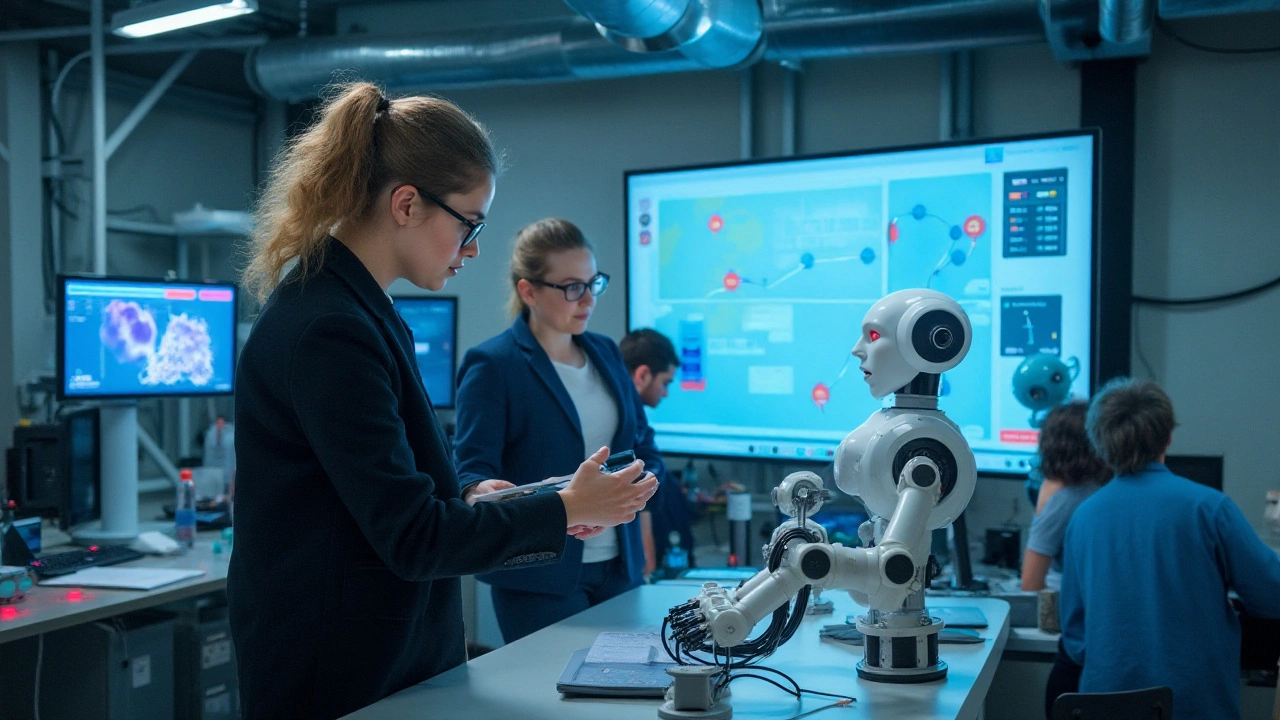The world is evolving at a pace where artificial intelligence (AI) is no longer just a futuristic concept but a central part of our everyday lives. As technology continues to infiltrate various sectors, understanding AI has become crucial for anyone looking to stay relevant and competitive. Whether you're a student, a professional, or merely an enthusiast, diving into AI learning opens a world of opportunities and innovation.
Learning AI isn't just about programming or engineering; it's about comprehending the impact and potential of these technologies in diverse fields. From healthcare to finance, AI is revolutionizing how we solve problems and make decisions. The journey can be both exciting and challenging, but with the right guidance, resources, and mindset, anyone can step into this digital future with confidence.
- The Rise of AI in Education
- Key Concepts in AI Learning
- Practical Applications of AI Skills
- Resources and Tools for AI Mastery
The Rise of AI in Education
Artificial intelligence is reshaping the world, and its influence is nowhere more evident than in the realm of education. With the increasing accessibility and advancement of AI learning tools, educational systems globally are experiencing a transformative shift. Schools and institutions are steadily integrating AI into their curricula, not merely as a subject of study but as a tool that enhances learning experiences and outcomes. In recent years, AI's potential to customize and improve the educational experience has been widely recognized, leading to its incorporation at various levels of the educational hierarchy. This change not only supports educators but also empowers students by providing personalized learning paths tailored to each student's unique needs and abilities.
One of the most significant impacts of AI in education today is its ability to personalize learning. AI algorithms can analyze a student's learning habits and results to tailor educational materials and methods to the individual's specific requirements. This personalized approach ensures that students receive support where they need it the most, allowing for a more efficient and effective learning process. For instance, platforms such as Coursera and Khan Academy use AI to recommend courses based on users' previous interactions and performance on the site. Such use of AI boosts students' engagement by providing them with content that directly aligns with their interests and competencies.
Another area where AI is making waves is in grading and administrative tasks. Traditionally, grading has been a time-consuming task for educators, yet with AI-powered systems, this task becomes significantly less burdensome. Machine learning algorithms can process exams and assignments with a similar, if not higher, accuracy than human graders. This shift means that teachers can spend more time dedicating themselves to actual teaching and interaction with students. A report by McKinsey & Company highlighted that AI can drastically reduce the time educators spend on administrative functions, predicting AI could automate up to 20% of teachers' tasks, allowing them to focus more on student engagement and lesson planning.
The rise of AI brings along a fascinating new field of study as well. Students are not only using AI tools but are also delving into the subject of artificial intelligence as a critical component of their education. Universities and online platforms are now offering specialized courses on AI, machine learning, and data science. This approach prepares the next generation of learners to enter a marketplace that increasingly demands tech-savviness. As AI technology continues to develop, having a robust understanding of its principles becomes ever more crucial, paving the way for a future workforce comfortable and competent in deploying these technologies effectively and ethically.
"AI in education is less about replacing teachers and more about augmenting them," says Rose Luckin, a Professor of Learner Centred Design at UCL Knowledge Lab. "It is about providing teachers with the tools to offer personalized support to their students and streamline their bureaucratic tasks."
To summarize, the rise of AI in education is driven by its ability to create personalized, engaging, and efficient learning experiences. As technology education continues to grow, students and educators alike are finding themselves on the cutting edge of what education can achieve with the integration of artificial intelligence. Embracing this change not only supports today's educational needs but also prepares society for an automated future where AI will play an even more dominant role in various facets of human life.

Key Concepts in AI Learning
Embarking on the journey to learn AI involves a tapestry of concepts that come together to form the spine of this transformative technology. At its core, artificial intelligence aims to create systems capable of performing tasks that, when done by humans, require intelligence. These tasks range from recognizing speech to making complex decisions in a split second. Central to AI's architecture are algorithms, often perceived as the magic recipes enabling machines to learn from data, improve their performance, and make predictions without being programmed explicitly for each task.
A pivotal aspect of AI is machine learning, a subset that focuses on the development of computer programs that can access data and use it to learn for themselves. Here, algorithms play a significant role by analyzing patterns, spotting anomalies, and extracting insights from vast amounts of data. Supervised learning, unsupervised learning, and reinforcement learning are essential types of machine learning, each with its unique methodology and application. Supervised learning uses labeled data to train algorithms, unsupervised learning deals with unlabeled data to find hidden patterns, and reinforcement learning adopts a reward-based approach to decision-making.
Deep learning, an extension of machine learning, mimics the human brain's neural networks, though in a significantly simplified and specialized way. Deep learning models, often known for their impressive accuracy and robustness, are behind some of the most groundbreaking AI advancements like language translation apps and image recognition systems. These networks have layers of interconnected nodes, where each layer transforms the input for the subsequent layer through mathematical computations. The beauty of these systems lies in their ability to improve continuously as they 'learn' from more data.
It's important to note the role of natural language processing (NLP), an AI capability allowing machines to understand, interpret, and respond to human language in a valuable way. NLP is what powers tools like chatbots and virtual assistants, transforming the way we interact with technology. This subfield integrates linguistics, computer science, and AI to handle the complexities of human communication, including nuances, slang, and context.
"Artificial intelligence is the science of making machines do things that would require intelligence if done by men." - Marvin Minsky
Ethics and bias in AI are also crucial concepts under the AI learning umbrella. As AI systems make more critical decisions in areas such as hiring, law enforcement, and credit scoring, ensuring they do so fairly and without bias becomes paramount. AI systems must be trained on diverse and representative data to avoid perpetuating stereotypes or discriminatory practices. This ethical dimension is as technical as it is philosophical, requiring a balance between innovation and responsibility.
Finally, understanding AI's impact on employment and society is part of grasping its key concepts. While AI can automate repetitive tasks and increase efficiency, it also raises questions about job displacement and the future of work. Skills in AI learning can make one adaptable in this rapidly evolving landscape, turning the potential threat of AI into an opportunity for human creativity and strategic thinking.

Practical Applications of AI Skills
In today's digital landscape, AI learning is not just confined to theoretical boundaries; it is deeply woven into practical applications that span a multitude of sectors. When we talk about the digital future, AI is already paving the way, significantly altering how industries operate and enhancing their efficiency. In healthcare, AI is revolutionizing patient care by offering predictive analytics that improve diagnostic accuracy, which can lead to better outcomes. Hospitals are utilizing AI to sift through massive datasets to identify patterns that a human might overlook, ultimately streamlining treatment plans and reducing operational costs.
The finance sector is another area where AI demonstrates remarkable capabilities. Through advanced algorithms, AI is transforming how banks detect fraudulent activities, thus safeguarding client information more effectively than ever before. It enables real-time analysis and makes precise predictions that help in asset management and financial planning. AI's ability to process high volumes of transactions with remarkable speed and accuracy provides invaluable insights, assisting financial institutions in decision-making processes.
In retail, AI is enhancing customer experiences through personalized recommendations and inventory management. AI-driven data analysis helps retailers understand customer behavior, allowing them to tailor their marketing strategies accordingly. AI is instrumental in monitoring inventory levels, predicting stock shortages, and optimizing supply chain operations. This ensures that businesses minimize waste and meet market demands effectively. According to a study by the International Data Corporation, businesses that implemented AI technologies experienced a 30% increase in customer satisfaction levels.
Education is another frontier where AI skills are being effectively harnessed. By integrating AI tools into classrooms, educators can provide personalized learning experiences that cater to the individual needs of students. AI systems can analyze student performance data to identify areas where learners are struggling, enabling teachers to adjust their methodologies accordingly. These applications are not limited to traditional classrooms; online learning platforms greatly benefit from AI technologies by enhancing course offerings and providing intelligent tutoring systems.
Another compelling area is the use of AI in environmental conservation. Scientists employ AI algorithms to analyze climate data, predict weather patterns, and monitor biodiversity. This data is crucial for formulating strategies to combat climate change and promoting sustainable practices. Drones and AI-powered cameras help track wildlife movements and habitats, alerting conservationists to potential threats. Such technology provides a glimpse into the potential of AI skills in solving some of the most pressing environmental challenges of our time.
"AI is not just a technology, it's the world moving from being data-driven to intelligence-driven," said Sherry Turkle, MIT Professor of Social Studies of Science and Technology.
As AI continues to permeate these various domains, possessing AI skills will not only open doors to high-demand job opportunities, but it will also empower individuals to contribute meaningfully to society. The growth of AI highlights a profound shift in our economy and societal fabric, making it essential for today's learners to embrace these tools and techniques. It is crucial to equip oneself with these skills, as they are instrumental in navigating and thriving in the rapidly evolving digital landscape.

Resources and Tools for AI Mastery
Diving into the world of AI learning can feel daunting, but with the right resources and tools, mastering it becomes an achievable goal. The variety of options allows for personalized learning paths depending on your existing knowledge and specific interests within AI. Key platforms like Coursera, Udacity, and edX offer comprehensive courses that cover a spectrum from beginner to advanced levels. These courses are often curated by industry professionals and academics who provide both theoretical and practical insights into artificial intelligence.
Among the plethora of tools available, TensorFlow and PyTorch stand out as essential frameworks. TensorFlow, developed by Google Brain, is particularly favored for deep learning projects and provides robust components for research and production. PyTorch, on the other hand, is known for its simplicity and dynamic computational graph, making it a valuable ally for experimentation and learning. Each of these frameworks has a vibrant community that contributes tutorials, documentation, and forums where newcomers can seek advice and share their journey.
For those who enjoy a hands-on approach, Kaggle offers a practical way to apply skills in real-world scenarios. It hosts datasets and competitions which allow you to tackle problems faced by data science teams today. Participating in such challenges enhances one’s understanding of AI, bridging the gap between theory and practice. A quote often cited by AI enthusiasts, "In kaggle you learn to swim by swimming", encapsulates the experiential learning one gains through this platform.
Attending conferences and workshops remains another significant resource for AI mastery. Events like the Neural Information Processing Systems (NeurIPS) and the International Conference on Machine Learning (ICML) are extraordinary opportunities to immerse yourself in cutting-edge research, network with professionals, and have your questions answered by leading experts. While these may seem overwhelming initially, they provide invaluable insights into the direction in which AI is moving.
Podcasts and blogs are also worthy companions on your learning journey. AI Alignment Podcast discusses topics around the future of AI and its impact, while blogs like Towards Data Science on Medium share a myriad of perspectives and tutorials that are enlightening for enthusiasts at any stage. With each resource, the goal is not just to absorb information but to cultivate a deeper understanding that inspires confidence and innovation in utilizing AI across multiple industries.

